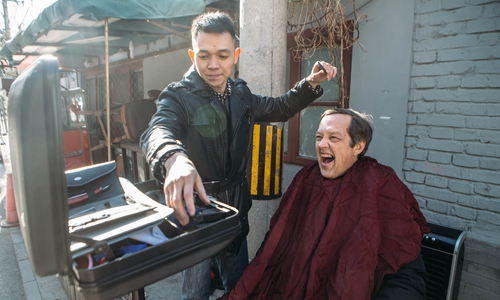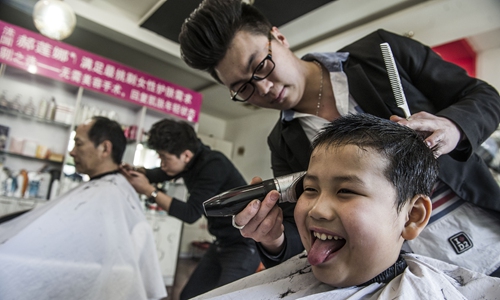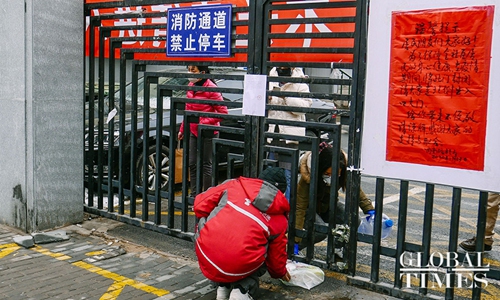Salons gradually return to business in Beijing ahead of China's traditional 'haircut' holiday

A foreigner gets a haircut in an alleyway at the Houhai area in Beijing on January 21, 2017. Photo: Li Hao/GT
The Longtaitou Festival is on Monday. Longtaitou means "dragon raises its head" and refers to the return of spring after winter. During this festival, also known as Eryue'er (Lit: two month two) since it falls on the second day of the second month of the Chinese calendar, people hold celebratory events such as dragon dances. It is also on this day that people traditionally go get a haircut so barbershops and hair salons are usually fully packed. However, with the current COVID-19 outbreak, many public facilities and stores have shut their doors. So how do people plan to get their traditional hair cut on this day?
To cut or not to cut
While Chinese people usually cut their hair on this day, it is taboo in some parts to get a haircut during the first month of the Chinese calendar. In Northern China, there is a saying: "If you cut your hair in the first month of the new year, the uncles on your mother's side will die."
Actually this tradition is rather new, relatively speaking.
"This was no such concept as cutting one's hair until around the Ming Dynasty (1368-1644) and Qing Dynasty (1644-1911). Because people of the Han ethnic group believed 'Our bodies - to every hair and bit of skin - are received by us from our parents, and we must not presume to injure or wound them. This is the beginning of filial piety,'" Xiao Fang, deputy director of China Folklore Society, told People's Daily Online, quoting from Xiaojing, also known as The Classic of Filial Piety, a Confucian classic.
Yet during the Qing Dynasty, men were required to shave the front portion of their heads and braid their remaining hair as the Manchu people did. It was during this time that the people of the Han ethnic group developed the custom of not shaving their heads during the first month of Chinese calendar for what they called sijiu (remembering the past). The pronunciation of sijiu sounds very similar to "death of uncles on one's mother's side," which probably is what lead to the saying, Xiao explained.

A hair dresser gives a boy a haircut in Beijing during the Longtaitou Festival on March 13, 2013. Photo: Li Hao/GT
Slow and steady, back on track
In an attempt to limit social contact and slow the spread of COVID-19, many public facilities and stores are now closed, including barbershops and hair salons.
On Tuesday, the Beijing Hairdresser and Beauty Association announced that barbershops and hair salons in Beijing will gradually return to business but remain tightly regulated. So far, 29 stores have opened and are already taking reservations for the traditional holiday, which is presumed to be a very busy day.
Besides professional hair salons, about 100 supermarkets are collaborating with barbers to provide pop-up quick haircuts for 10 yuan, less than $1.50. People must scan a QR code by the store and wait for their number to be called as only one customer is allowed in at a time, the Beijing Daily reported.
"I haven't got my hair cut for a long time. While I was passing by and saw a shop open. I went in and got my hair cut, which only took five minutes," said a deliveryman happily after getting his hair cut at Meilianmei Supermarket in the Guanzhuang area in Beijing.
Among the stores that have returned to business, most have shortened their business hours and limited the types of services they provide to quick haircuts rather than relatively time-consuming services such as hair dying. Both customers and staff members have to deal with stringent health and safety measures, like having body temperatures checked and hands disinfected.
Four branches of the FEEL Hair Salon chain are included on the list of the 29 stores that have opened. Du Jinsuxi, manager of a FEEL Hair Salon at the Capital Mall, a popular shopping mall in Beijing's Wangjing area, told the Global Times on Thursday that the store had been following the business hours of the mall,10 am to 6 pm, which was shortened from the usual hours of 10 am to 10 pm.
"We are limiting the number of customers to two to three in the shop at the same time," said Du. "We don't take walk-ins, as we have to control the number of customers. They need to make reservations either via phone or through Dazhongdianping (China's Yelp equivalent). As to Eryue'er, reservations are already full, since we are only planning to take about 20 customers or so."
While Du noted that he will experience a significant decrease in profit given the drop in the number of customers, he was glad his business was gradually getting back on track.
In regions where public facilities and stores still remain closed, people don't appear to be worrying much about getting a haircut on time, and some are choosing to do it at home.
With more than 2 million deliverymen returned to work, the country's courier sector has resumed over 40 percent of its normal delivery capacity, according to data from the State Post Bureau.
"I'm so happy to see my order has been shipped. It seems that I'll be able to shave my baby's head at home on Eryue'er," wrote a mother on China's Twitter-like Sina Weibo who posted a photo of her shipment information for a baby hair trimmer.

Deliveryman passes a package to a resident through locked gate in Beijing on February 5. Photo: Li Hao/GT